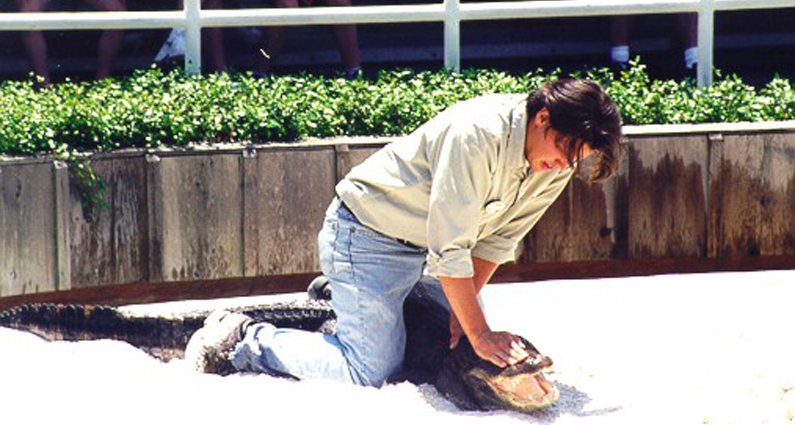
Florida alligators
Back from the brink of extinction, these resourceful reptiles remain the victims of cruelty
Alligators, as top predators, play an important role in Florida’s ecosystem. Alligators build nests and dig large holes (“gator holes”) that create habitat for a wide variety of wildlife, especially during droughts. Alligators have complex social behavior, including elaborate courtship displays. You can hear the bellowing of courting alligators in swamps in the spring. Alligators communicate vocally, and visually through body postures. Female alligators are very protective of their nests, and baby alligators will stay with their mothers for as long as two years. Alligators can live to be more than 35 years old in the wild.
These unique animals have existed for millions of years. Yet alligators have much to fear when they encounter human beings, who have left them with dwindling habitats. To make matters worse alligators are tormented and killed for amusement and profit.
Florida’s alligator hunt
The alligator is the only animal in Florida that hunters kill in expectation of a financial reward. The skin and flesh of dead alligator’s is commonly sold to processors who wait at the docks for hunter’s boats to return.

You Can Help
Writing a letter to the editor of your local newspaper in response to articles about “nuisance” alligators or Florida’s alligator hunt is a great way to encourage compassion for these much-maligned animals. Contact ARFF for tips on writing letters to the editor.

Alligator wrestling is one of Florida’s worst attractions. Shows are billed as “Man vs. Gator,” a contest in which the odds are stacked against the alligator. One thing is certain: alligators are never willing participants in this spectacle.
During wrestling shows, alligators are roughly treated and intentionally provoked in order to entertain a crowd. The show begins when an alligator is dragged by the tail into the center of a ring. Wrestlers may torment the animal with a stick or hit the animal on the nose until the animal opens his or her mouth (to show the alligator’s teeth to the crowd). Wrestlers often jump onto the alligator’s back, or force the mouth closed and attempt to flip the animal. This can cut off circulation to the brain, and the show ends with the overturned alligator losing consciousness. In May 2010, a wrestler was bitten by an alligator during a show in New Port Richey (the man required 36 staples and 23 stitches to close severe wounds on his arm and hand). In video of the incident, the wrestler is shown pulling the alligator around a ring by the tail, and prodding the alligator with a stick. In an interview with the St. Petersburg Times following the incident, the wrestler explained that without a display of aggression from alligators during a show, the audience loses interest.
You Can Help
Don’t support tourist attractions that feature alligator wrestling. Ask friends and family members visiting Florida to do the same.
After decades as a roadside attraction in Florida, alligator wrestling is becoming less common. Please write to the following attractions where alligator wrestling can still be witnessed and urge them to discontinue the cruel spectacle. Tell them that there is nothing educational about the harassment and abuse of wildlife.
• Everglades Holiday Park (Fort Lauderdale)
E-mail: info@evergladesholidaypark.com
Online comment form.
• Seminole Okalee Indian Village
(located at the Seminole Hard Rock Hotel and Casino, in Hollywood)
Online comment form.
• Everglades Alligator Farm (Florida City)
E-Mail: info@everglades.com
Online comment form.
• Gator Park (Miami)
E-mail: elinaw@msn.com
• Gator Golf Adventure Park (Orlando)
Phone: (407) 363-2001
Living with Alligators
Alligators are part of what makes Florida unique and we must learn to respect them. Although they may seem intimidating, alligators are naturally fearful of humans and attacks are rare—typically occurring when people have unnatural interaction with alligators (such as feeding), disturb their territory or pose a threat to their young. Habitat preservation, combined with respect and a basic understanding of alligator behavior are key to maintaining a healthy relationship with our wild neighbors.
The Florida Fish and Wildlife Conservation Commission suggests following these safety tips:
- When working or relaxing near water, be aware of your surroundings. Alligators live in fresh or brackish water and are most active between dusk and dawn.
- Never allow children or companion animals to play unsupervised in or around waters that may contain large alligators.
- Observe and photograph alligators only from a distance.
Educate friends and family about alligators and how they are vital to Florida’s ecosystem.
Please don’t feed alligators. Like other wildlife, alligators may become accustomed to handouts and grow dependent on humans—a risky proposition for both feeders and animals. This dependency endangers the lives of alligators, since those who come too close to populated areas searching for food are usually considered a threat and killed. Feeding alligators is against the law in Florida.
Animal Rights Foundation of Florida
PO Box 39352, Fort Lauderdale, FL 33339
arff@arff.org
Promoting respect and compassion for animals in Florida has been the mission of the Animal Rights Foundation of Florida since 1989.
The Animal Rights Foundation of Florida is a 501(c)(3) nonprofit organization.